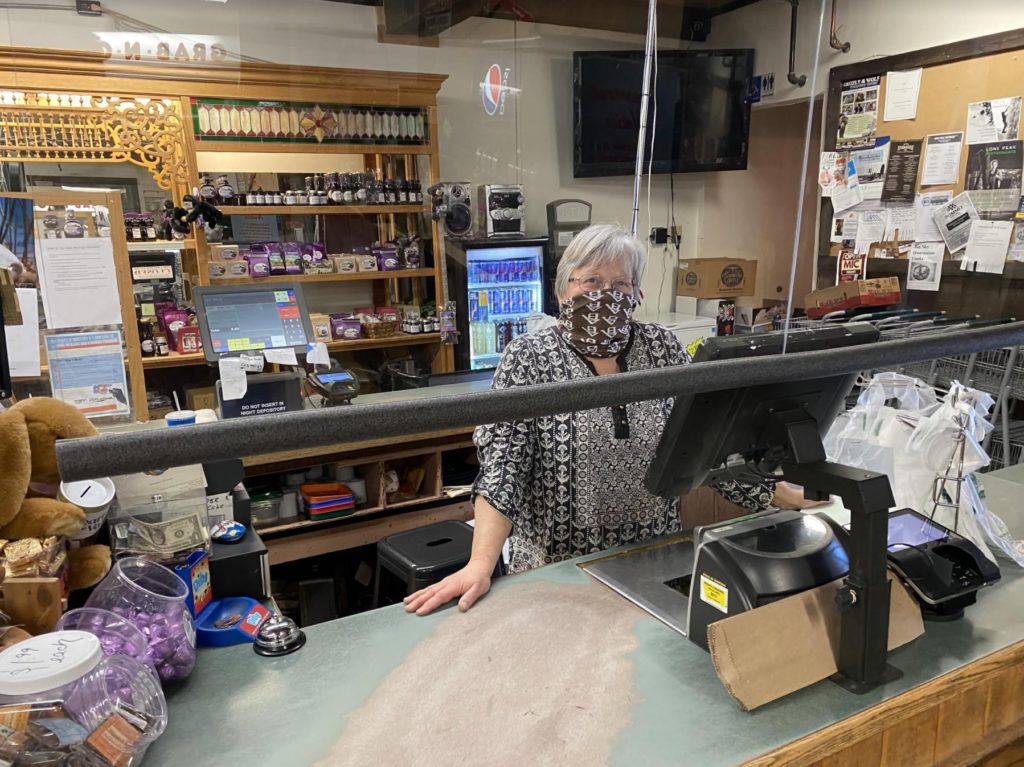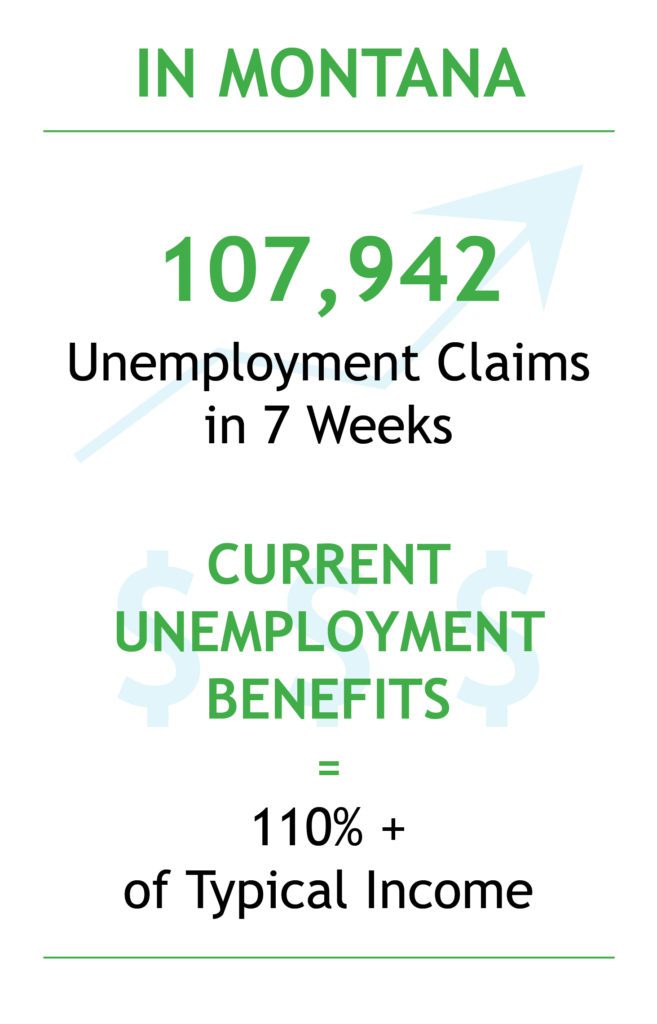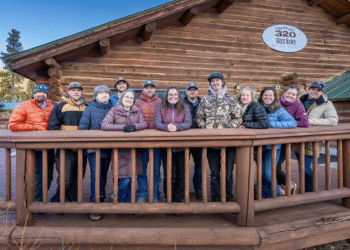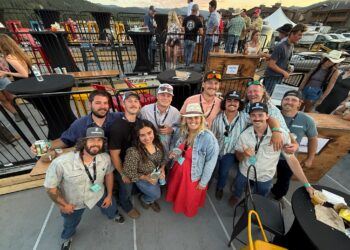By Bella Butler COMMUNITY AND ENVIRONMENT EDITOR
BIG SKY – Megan Rhead rings up a package of tortillas behind the counter at The Country Market. A pane of plexiglass separates her from the customer, and a patterned cloth mask covers her nose and mouth. It’s 2 p.m., time to clock out. She arrived for her shift at 6 a.m., just as she does five days a week.
Despite quarantine conditions keeping most of the Big Sky community homebound, Rhead comes into contact with dozens of people each day, oftentimes more. Between 6:30-8 a.m. in the morning when the store offers free coffee, she estimates crowds of up to 50 patrons circulate through the tight aisles and pass through the checkout line.
In the evenings, she returns home to the house she shares with her bosses, Lynne and Steve Anderson, who both qualify as at-risk for Covid-19 by multiple counts; the plexiglass, the gloves and the masks are not enough to create complete security. Rhead is aware of the risk she is exposed to everyday as a front-line worker during the pandemic, but she’s committed to her job, her boss and the service to her community.
Meanwhile, Montana saw 107,942 initial unemployment claims filed between March 8 and April 25. As businesses shuttered their doors in a collective attempt to flatten the curve, the federal Coronavirus Aid, Relief, and Economic Security Act established the Federal Pandemic Unemployment Compensation program to further support furloughed and laid-off laborers: it amounts to $600 per week on top of unemployment benefits.
Under normal circumstances, unemployment benefits compensate a percentage of an unemployed individual’s former salary or wage in what is called the replacement rate, which varies state to state. Funds from the FPUC added a weekly payment of $600 to eligible people’s unemployment payments in an effort to bring the average national replacement rate to 100 percent. But in states like Montana, where unemployment benefits are generous and wages are low, the entire concept of unemployment has been flipped on its head.
“Traditionally, the idea of unemployment insurance was to incentivize people to return to work. But in this contagious pandemic, the philosophy behind unemployment insurance is to incentivize people to stay home,” said Malin Johnson, a Missoula lawyer and adjunct professor at the Alexander Blewett III School of Law at the University of Montana who has taught employment law since 2013.
Johnson explained that in Montana, where the unemployment replacement rate is in the neighborhood of 50 percent and the median annual income is approximately $52,000—or $1,000 week—most Montanans currently receiving standard unemployment benefits as well as the weekly $600 are earning more on unemployment than they do on the job—sometimes upwards of 110 percent.
“Unfortunately, in the state of Montana,” she said, “that makes it not even worth it to go to work unless you have a really high paying job.” Johnson deduced that one would need to earn more than $60,000 annually in order to receive an income comparable to current unemployment payments.
A laid-off Big Sky resident who previously earned $1,000 a week, the state average, could potentially earn 135 percent more than their wage through combined payments from unemployment, an FPUC bonus and a Big Sky Relief individual grant, which can be up to $1,500 for a period of 45 days. At The Country Market, an employee’s starting wage is $13 an hour, making the weekly wage for a full-time employee, like Rhead, $520 before taxes. For Lynne Anderson, who has owned The Country Market for nearly 20 years, this disparity in compensation is irritating.
“I resent the fact that they’re putting themselves on the line and they’re getting the short end of the stick,” Anderson said of her 13 employees. Rhead added that an unmonetized benefit of being on unemployment is the safety of staying at home. All it takes, she said, is one person to come in without a mask and everyone in the store could potentially be exposed.
“I don’t understand how they are the ones most at risk and the least cared for,” Anderson said.

The compelling incentive to stay at home is disparaging businesses deemed nonessential, as well, according to local business owners. Andrew Schreiner, co-owner of Grizzly Outfitters, expressed the moral dilemma he is currently plagued with after reopening his retail store following permission from the state.
“I’m frustrated by the stimulus money because I want to take people and put them back to work but then I’m really taking something from them,” he said. According to Schreiner, he is now he now struggles between choosing to contributing to a necessary economic reboot in his community and protecting the health and financial interests of his employees.
As an act of support, Schreiner said he waved recent rent payments for workers living in Grizzly’s employee housing and maintained benefit packages. He and co-owner Ken Lancey want to feel good about handling their staff, but also recognize that employees staying home were making more money while undertaking fewer expenses.
For other business owners like Alex Omania of the Lotus Pad, it’s less about caretaking and more about the feasibility of running a business. Until recently, Omania questioned her ability to open her restaurant for dine-in service due to an absent staff. She said that many of her employees work more than one job in order to meet the cost of living in Big Sky, a town-wide trend, which means they’re collecting unemployment on behalf of their other jobs.
Legally, when the unemployed are offered a chance to return to work and decline the opportunity, they are no longer eligible to receive unemployment payments associated with that job. Omania said that despite having this leverage, her employees that are still eligible to collect unemployment on behalf of other jobs would only lose a portion of their unemployment and in many cases would still receive the FPUC’s additional $600 each week. Johnson, the UM law professor, echoed that while this condition of unemployment may motivate some to return to work, it’s not enough to return the workforce to a satisfactory capacity.
Omania is concerned about how the Big Sky community will operate without international workers and local employees opting to stay home until July 31, when FPUC payments will cease. “We’re used to dealing with a lack of employees, but we’re not used to dealing with straight out not having any,” she said.
Montana is unique in its employment laws and its low wages, and Johnson predicts it will take more time for the workforce to recover here than in other states. “We’re likely to have interruptions in a lot of our essential services between now and July 31 because we won’t have a supply of low-wage essential workers willing to go back to work and fill those jobs.”
Anderson, who recently received funds from her Paycheck Protection Program loan, is struggling to fill the two additional full-time employee positions she needs for her loan to be forgiven. Most people who reject her offer to work say the unemployment payments they receive greatly outcompete what they would earn unloading trucks and scooping deli pasta salad at the market.
Anderson shows up at her store each day out of duty to her business but also to honor her commitment to the community, and she thinks people appreciate it. In many cases, though, this sense of service is overshadowed by a number of other factors, according to Johnson.
“Not many people are going to go back to work out of a sense of civic duty,” she said. “They’re more likely to do it out of a sense of economic necessity, and the government hasn’t given that to them.”
Johnson, who practices employment law at the Missoula-based firm Johnson & Johnson, PLLC, believes that dialogue around employee compensation will open up drastically post-pandemic. Some employers stated an interest in seeing changes at the federal level, and Johnson says the best solution is adding incentives for essential employees to return to work rather than adjusting incentives the unemployed are receiving to stay home. “I think the answer is to pay more money to the people who do the work that society needs done,” she said.
Such action is in the works. On April 3, Michigan Congressman Bill Huizenga introduced the Helping Emergency Responders Overcome Emergency Situations Act. Aptly referred to as the HEROES Act, the proposed legislation seeks to offer a tax break for medical professionals and first responders who work in counties where one or more COVID-19 cases have been diagnosed.

On April 7, a few days after Rep. Huizenga proposed the HEROES Act, U.S. Senate Democrats put forth the suggested Pandemic Premium Pay Fund, commonly referred to as the Heroes Fund. The Heroes Fund is designed to achieve two things: provide bonus income for workers currently categorized as essential, and establish a fund to provide employers with recruitment resources to help bring employees to the front lines.
The Heroes Fund would present essential workers with a premium pay of $13 an hour on top of wages already being earned, beginning retroactively on Jan. 27 and lasting until the end of 2020. For essential workers who earn under $200,000 a year, the aid would cap at $25,000, and for those that earn more, the cap is proposed at $5,000. The fund would also grant the premium payment to families of front-line workers that have died as a result of COVID-19.
This is precisely the kind of incentive Johnson suggested would be key in maintaining a crucial essential workforce in the coming months, but Anderson and Rhead aren’t holding out hope for it to pass. Hazard pay isn’t currently offered to the staff at The Country Market, but Anderson, who calls her staff family, rewards her employees in other ways when she is able.
Rhead graduated from the University of Utah with a degree in wildlife ecology and management, but is considering staying on at The Country Market instead of filling a summer position as a Colorado park ranger because she believes she can do more good at the store working for Anderson. She’s struck by selfless gestures her coworkers make, like calling elderly community members after a shift to see what they can bring them.
After living all over the country, Rhead has grown to love the community of Big Sky during her tenure at The Country Market and is inspired to return to work at 6 a.m. in the morning, clad in PPE, to do her job.














